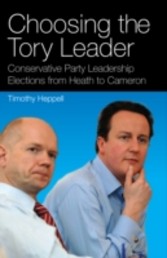Suchen und Finden

Choosing the Tory Leader - Conservative Party Leadership Elections from Heath to Cameron
Mehr zum Inhalt

Choosing the Tory Leader - Conservative Party Leadership Elections from Heath to Cameron
The means by which the Conservative Party have determined their party leadership has produced some of the most dramatic political theatre of the last four decades. The disputed succession to Harold Macmillan and the discrediting of the magic circle, the procedural changes designed to evict Edward Heath, the brutal political assassination of Margaret Thatcher, the bizarre resignation and immediate re-election of John Major, the putsch against Iain Duncan-Smith and the ritual acclamation of Michael Howard, only to have him replaced by the unexpected election of David Cameron have demonstrated the capacity of the Conservatives for political intrigue. _x000D_In this new evaluation Timothy Heppell assesses the way in which the Conservative Party have determined their leadership since the 1960s. By considering the events that led to each leadership election, the candidates standing and their campaigning strategies, he explains how and why respective victors were elected. He argues the Conservatives have been maladroit when constructing their electoral procedures, they have returned unexpected party leaders, many of whom were to suffer from crises of legitimacy and accusations that they were default leaders. He observes how the dominance of ideology, as a destabilising influence on incumbents and a voting determinant in leadership elections, has been immensely disadvantageous to post-Thatcherite Conservatism. Rather than empowering incumbents to project their leadership credentials outwards to the electorate and against their Labour counterpart, successive post-Thatcherite Conservative party leaders have been forced to look inwards, devoting crucial time to the complexities of intra-party management and the threats against them from rivals from within the parliamentary party. Heppell concludes by asking whether the undisputed mandate and ideological pragmatism of David Cameron indicates that the Conservatives are learning from these mistakes in their own recent past.
Alle Preise verstehen sich inklusive der gesetzlichen MwSt.





